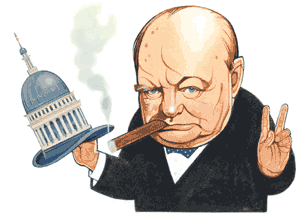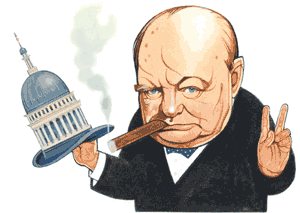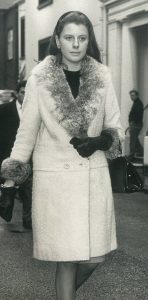
Finest Hour 166
Books, Arts & Curiosities – Rollicking Prose

July 24, 2015
Finest Hour 166, Winter 2015
Page 26
By ROBERT COURTS
 “Is Boris seeking to compare himself to Winston?” ask the politicos. Anyone who has read Boris’s The Dream of Rome will be familiar with his talent for taking a subject he is familiar with and using it to illustrate a contemporary political point. But this is overlooking the merits of the book in search of an obvious and clumsy parallel.
“Is Boris seeking to compare himself to Winston?” ask the politicos. Anyone who has read Boris’s The Dream of Rome will be familiar with his talent for taking a subject he is familiar with and using it to illustrate a contemporary political point. But this is overlooking the merits of the book in search of an obvious and clumsy parallel.
Certainly, the willing can draw similarities between Boris and Winston. No-one called Winston “Churchill,” and everyone, friend and foe, calls Boris by his Christian name. Both reach parts of the electorate other politicians cannot. Both held political office at the same time as writing books and articles for the media. Both are idiosyncratically dressed. Both are half-American. Above all, both are possessed of a titanic work ethic. Boris knows that when he expresses admiration of Winston’s qualities, his readers will pause to consider that the same may be true of their erstwhile author.

2024 International Churchill Conference
Boris does not claim to be a Churchill scholar; throughout he gives praise and thanks to our own Allen Packwood and Warren Dockter for giving him the facts. What Boris does do is tell a cracking story.
It is easy to see why Boris is popular. He has a gift for explaining complicated issues with simple clarity; helped by the fact that, as a prominent politician, he knows of what he speaks. He is strikingly original, a counterpoint to homogeneous career politicians. He says what he thinks: the revisionists are wrong (24); the decision to destroy the French fleet at Oran was “100% correct” (236). This is brave: Boris will know that, if his ambition holds and he holds high office in British government, the French will remember this comment. Moreover, Boris is frequently very funny: his throwaway comment about Mrs Everest telling Winston to take heroin for toothache (114), or over the Lady Aylesford affair (51) or how we only need a photograph of Winston in an Indian headdress for him to be able to pose as all the Village People (145).
We see how only Boris can get away with saying some things. The French Army is an “origami Army” (12), he wonders what would happen if “giant Monty Python hands” removed Churchill from history, Lord Randolph is described as a “tosser” (48) or a “shrimp-like fellow” (49) whilst Winston’s archaic language is akin to him “channeling Yoda” (255). We even see, in the acknowledgements, cheeky thanks to David Cameron for doing some devilling on the exact location of the fateful May 1940 meeting between Churchill and Chamberlain!
Of course there is the odd time when the purist might feel the idiosyncrasies become a bit too much: Churchill might be seen as a “burly and hungover butler from Downton Abbey” (13) or having a “clenched jaw with a spot of drool.” There may be a few too many uncritical references to Churchill being drunk, whilst Boris seems to stumble uncritically into the “poison gas” trap (328), not pointing out Churchill’s advocacy for non-lethal gas.
But to worry about these points would be churlish. The facts are right— with Dockter’s and Packwood’s help, they would be—but above all the judgements are sound. Boris rightly points out that the Conservative Party regards Churchill as Parma does “formaggio parmigiano” (31) and that this has always been disingenuous. It is unusual to see (32) a Conservative Party that hated Churchill in 1940 but now claims him as their own being given a good history lesson by a leading Conservative. The chapter on Winston’s views about “Europe” ought to be required reading for all politicians who seek to co-opt him to their cause. Above all, seeing the Tonypandy myth explained correctly and clearly is sufficient to forgive most slips.
Above all, the reader will appreciate the sheer ebullient sweep of the narrative; the chapters carry you along using Boris’s favoured “digressio” technique. There is the readability of the “rollicking prose” he praises in his hero; Boris’ imagination vividly evokes what it must have been like to be around Winston; the fact that, even to an old hack, the extraordinary story of Winston’s life is brought sparklingly to life. So, by all means read the book as an insight to Boris, but better to read it as an insight to Winston. Either way —do read it.
Subscribe
WANT MORE?
Get the Churchill Bulletin delivered to your inbox once a month.




